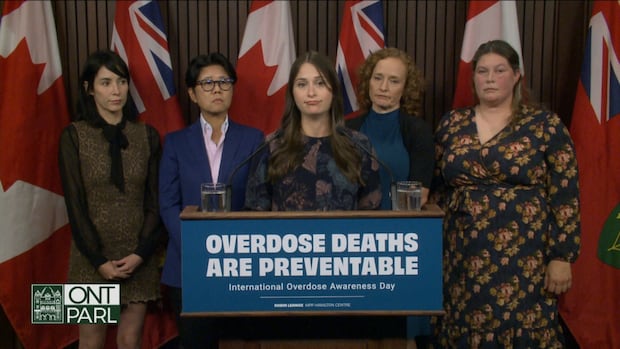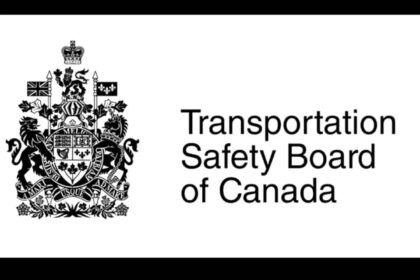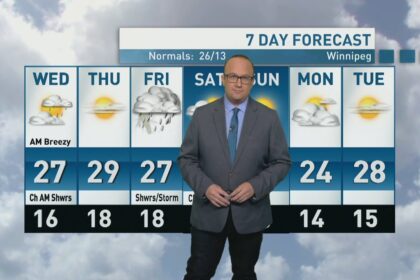TorontoOntario NDP MPPs and advocates are calling on the Doug Ford government to establish an emergency task force to address overdose deaths. Province defends closure of supervised injection sites in favour of HART HubsMuriel Draaisma · CBC News · Posted: Aug 28, 2025 8:11 PM EDT | Last Updated: August 29Ontario NDP MPPs and advocates called on the provincial government to set up an emergency task force to tackle opioid deaths in the province. From left to right: harm reduction advocate Diana Chan McNally, MPP Kristyn Wong-Tam, MPP Dr. Robin Lennox, MPP Alexa Gilmour, community advocate and parent Hannah Robinson. (CBC)Ontario NDP MPPs and advocates are calling on the Doug Ford government to establish an emergency task force to address overdose deaths.Dr. Robin Lennox, NDP MPP for Hamilton Centre, said a task force is necessary to develop and implement an overdose prevention strategy with the aim of reducing the harms of toxic drugs in Ontario communities. In March, the Ontario government closed nine supervised consumption sites and communities have felt the absence of these services since then, she said.”We need to use every tool at our disposal, including harm reduction and treatment, to save lives,” Lennox told reporters at a Queen’s Park news conference on Thursday.”Overdose deaths are preventable, but we need to act. In doing so, our communities will be safer for all of us,” Lennox said.”All decisions about public health need to be made with evidence and with empathy. The Ford government took away life-saving care without replacing it. Their decisions made our communities more unsafe, and their lack of a strategy is putting more people at risk.”Average of 7 Ontarians died per day from opioids last year: NDPAccording to the NDP, an average of seven Ontario residents a day died from opioid poisoning in 2024, for a total of 2,244 deaths. The Toronto Drop-in Centre Network, made up of more than 50 community agencies, reported a 288 per cent increase in overdoses at its member drop-in centres in June compared to the same month in 2023.The request comes ahead of International Overdose Awareness Day on Sunday.It also comes as data from Toronto Public Health shows that the city is seeing a drop in the number of opioid overdose deaths. In 2024, preliminary data shows that there were 459 confirmed and four probable opioid toxicity deaths in Toronto, while in 2023, there were 523 confirmed and four probable deaths.Lennox said fluctuations in the data can happen, depending on the toxicity of the drug supply.The majority of Homelessness and Addiction Recovery Treatment (HART) hubs, which the province is setting up to replace the closed supervised consumption sites, are not yet open yet while those that are open only have resources to offer minimal programming, she added.She said the HART hubs have not been given adequate funding or provincial direction “to hit the ground running” and there has been a net loss of services.Closing services takes away hope, mother saysHannah Robinson, an Ontario mother who lost her 17-year-old son David to an opioid overdose two years ago, also spoke at the news conference, saying the Ford government’s move to close safe consumption sites in favour of abstinence-based HART hubs doesn’t work.”Closing services without an adequate compassionate replacement is a death sentence. It takes away the one thing that the people who are fighting for their lives need, and that is hope,” she said.David, the son of Hannah Robinson, died of an opioid overdose two years ago at age 17. (Supplied by Hannah Robinson)Robinson said her son David struggled with his mental health before turning to drugs. She said he didn’t die without a fight. In the last six months of his life, he went to the hospital one more time and met a doctor who tried to help him, but ultimately relapsed.”He was sweet and stubborn, fiercely independent and stunningly naive. He had the cutest freckles and the biggest plans, and by the time he turned 14, we had already started losing him. At 17 years, one month and seven days old, he was gone,” she said.”David didn’t stop mattering when he started using drugs and when that turned into a substance use disorder,” she added.”I need you to remember that David still matters. We can still fight for him and all the other Davids, the sons, brothers, grandchildren, parents, aunts, uncles and friends who need services, access to care, and most of all, hope.”People who use drugs deserve to live, advocate saysDiana Chan McNally, a community worker, told reporters that the province has moved backwards by closing supervised consumption sites.”People who use drugs are deserving of the right to life, the right not to die because of an unsafe, toxic drug supply. Communities should not be finding their neighbours and their loved ones dead or overdosing on the streets. And all of what is happening now is entirely preventable, but only if the Ford government takes responsibility for the chaos that they have caused,” Chan McNally said.”Supervised consumption sites — they save lives.”In a statement on Thursday, Ema Popovic, press secretary for Ontario Health Minister Sylvia Jones, defended the government’s actions.”Instead of giving people tools to use illegal drugs, our government is making record investments to help break the tragic cycle of drug addiction with more mental health and wrap-around supports,” Popovic said.Popovic said the province is investing $550 million to open 28 HART hubs. She said HART hubs that replaced nine supervised injection sites opened on April 1, as planned.”As HART Hubs, each organization is receiving four times more funding than they did as drug injection sites, enabling them to deliver more comprehensive mental health and addiction treatment services,” Popovic said.According to the statement, data from Ontario’s Chief Coroner shows that following the closure of the supervised consumption sites, there has been a 41 per cent decrease in opioid-related deaths. Calls for overdoses to the Central Ambulance Communication Centre have also decreased by 50 per cent, compared to the same period last year, the statement said.With files from Lorenda Reddekopp
Friday, 6 Feb 2026
Canada – The Illusion
Search
Have an existing account?
Sign In
© 2022 Foxiz News Network. Ruby Design Company. All Rights Reserved.
You May also Like
- More News:
- history
- Standing Bear Network
- John Gonzalez
- ᐊᔭᐦᑊ ayahp — It happened
- Creation
- Beneath the Water
- Olympic gold medal
- Jim Thorpe
- type O blood
- the bringer of life
- Raven
- Wás’agi
- NoiseCat
- 'Sugarcane'
- The rivers still sing
- ᑲᓂᐸᐏᐟ ᒪᐢᑿ
- ᐅᑳᐤ okâw — We remember
- ᐊᓂᓈᐯᐃᐧᐣ aninâpêwin — Truth
- This is what it means to be human.
- Nokoma











